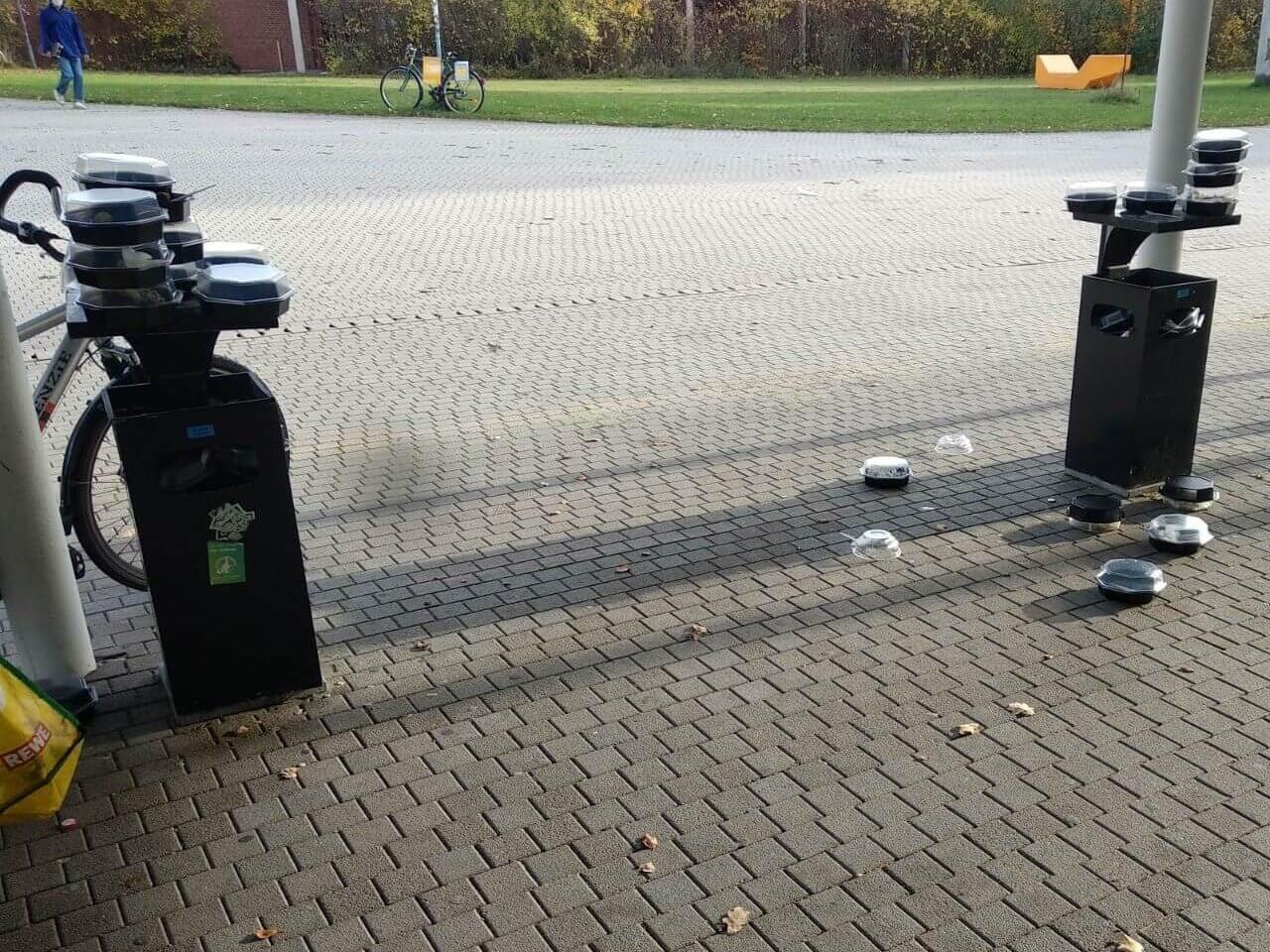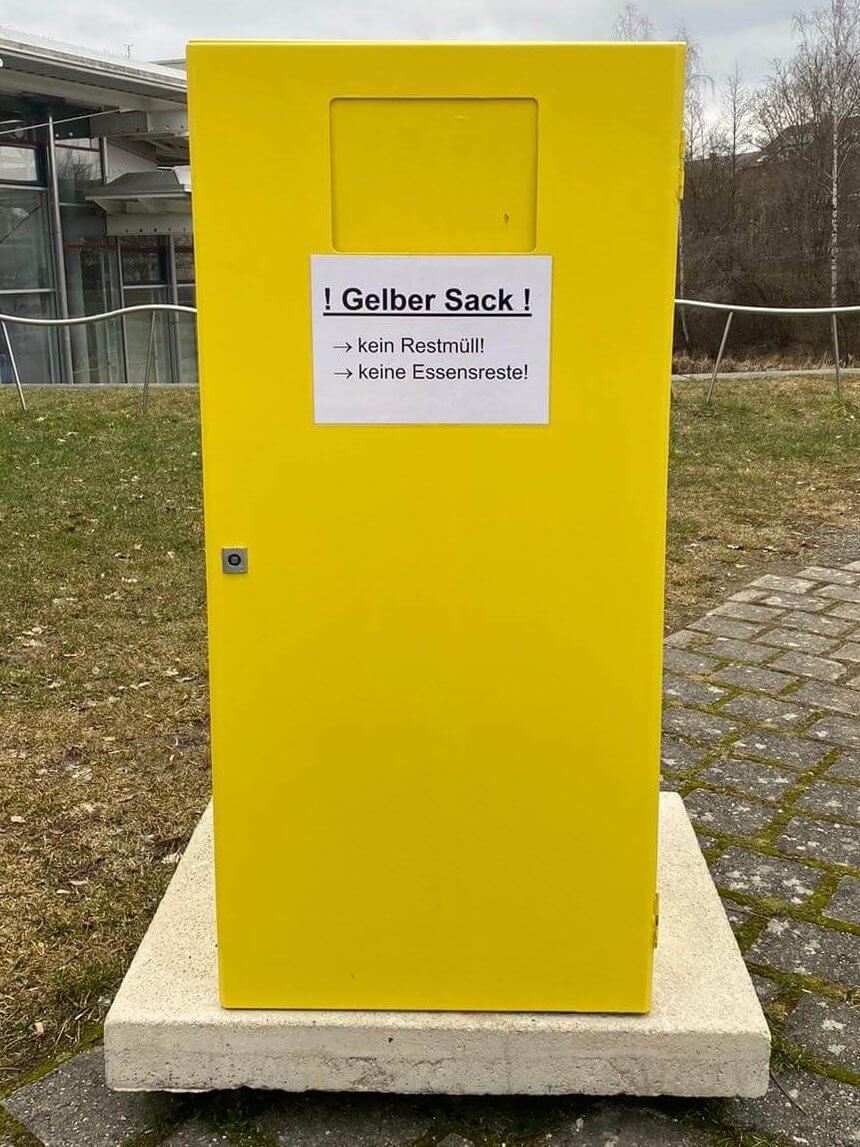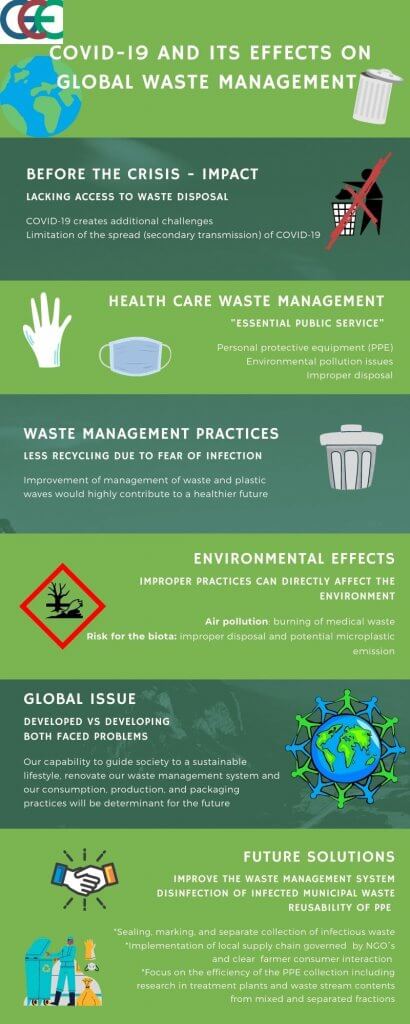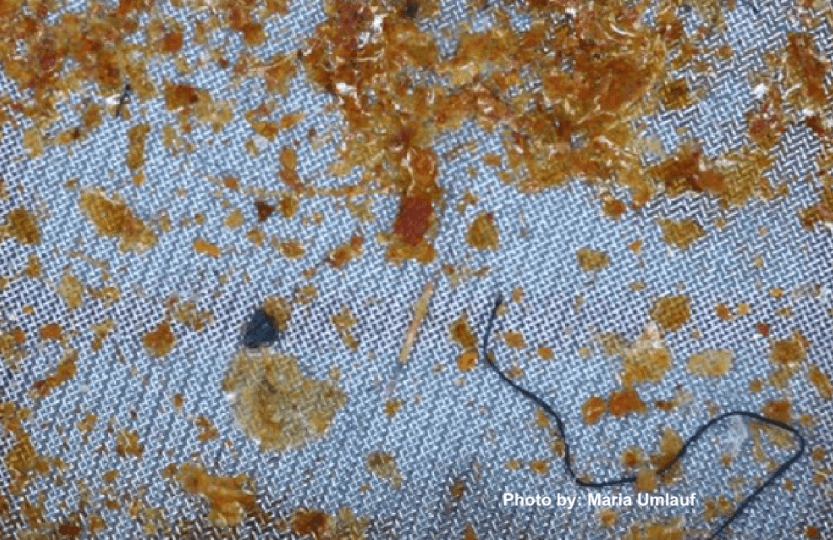If you have been to the University campus at the beginning of November, when the latest lockdown came into effect, you would have probably noticed a lot of plastic waste laying around. Due to new restrictions, the cafeteria had to swap from dine-in to take-out food from one day to the next. This resulted in students eating their lunch out of plastic containers outside, while socially-distancing. Relatively quickly, the trash bins started overflowing and plastic containers were discarded next to them, some still with food scraps inside. Observing this issue, it made us think about what effects the Covid-19 pandemic might have on plastic usage and, consequently, plastic pollution worldwide. This article provides an overview of what we have found in our literature research.

The plastic problem
Plastic pollution is one of the most pressing environmental issues that many countries struggle with worldwide. During the last decade, the detrimental effects of plastics on the environment and human health have been extensively researched. Experts all agree that plastic is harmful to humans and it takes over 1000 years to decay, degrading into microplastics and accumulating in ecosystems.
Microplastics are particularly persistent in the environment and hard to capture and recycle. It is important to note that they are not just a result of the breakdown of bigger plastic pieces, but are also produced, for instance, by cosmetic firms to be included in a range of cosmetic products. Hence, after usage of these products the microplastics get washed down the drain, move through the wastewater treatment system, and end up in rivers and oceans. Once released into aquatic ecosystems, the tiny plastic particles are taken up via the food chain and accumulate in the higher trophic levels, in a process known as bioaccumulation. Moreover, microplastics can accrue in the soil, affecting plant growth and soil biota.
The problem with bioaccumulation of plastics are specific properties that have been proven to affect the endocrine system of mammals. By binding to hormone receptors, ingested plastic will result in a downstream cellular effect, leading to developmental changes. Fish have been known to feminize, resulting in detrimental effects on the ecosystem and harming multiple relationship chains established throughout the systems.
Humans ingest plastics through food, handling receipts and drinking from plastic water bottles. This problem has been analysed by researchers at the University of Bayreuth, who in a recent study have detected various types of microplastics in mussels obtained from supermarkets. With microplastics present in food obtained from the supermarket, it seems impossible for us to avoid it in our daily lives. This illustrates how careless actions stemming from short-term convenience not only devastate long-established ecosystem dynamics, but also end up affecting us humans for decades to come.
Besides the effects of microplastic, the plastic litter in form of bigger pieces, called macroplastic, has a wide range of implications on the environment and ecosystems as well. These include entanglement, ingestion, and suffocation for organisms in marine and terrestrial environments.
Plastic usage in times of the Covid-19 pandemic
As the plastic pollution problem has been reported more and more in the media, the resulting rise in awareness of the effects of plastic usage on the environment greatly impacted governmental decision-making. New laws and specific legislation concerning plastic production and consumption were established. Several countries, including the EU and some U.S. States, started banning or were planning to ban single-use plastics, such as straws, cups and shopping bags, as well as the production of microbeads, which are commonly used in cosmetic products such as face scrubs and soaps. However, the Covid-19 pandemic has drastically affected the global efforts of tackling the plastic problem.
The pandemic has led to an arms race for personal protective equipment (PPE) all over the world. With an increase in both medical equipment such as facemasks, gloves and other protective clothing, as well as single-use plastics from food packaging, home-delivery services and e-commerce, the production and consumption of plastic immensely rose. Commitment to wear a mask has drastically increased the production of one-off masks and the resulting littering. It is estimated that there is a monthly need for 129 billion face masks and 65 billion gloves to contain the spread of the virus on a global scale. A large part of these can now be found as rubbish on the pavement or at the side of the road. In combination with other medical equipment, the resulting waste in the medical sector alone has increased to up to 370%.
Social trends amplifying this problem include a growth in the throw away culture and online shopping, as well as the increased demand for food delivery and take-away packaging. This is a direct result of the fear-driven perceptions of hygienic and recycled products, as well as the Covid-19 associated sanitary concerns. Estimations predict a 14% increase in plastic and corrugated grocery packaging in the U.S., while reports from a Spanish plastic packaging company show a sales increase of 40%. Additionally, the low oil prices caused by the crisis have reduced the competitiveness of recycled plastics, leading to an increased usage of virgin plastics.
Due to the growing demand for plastic, there has been a temporary relaxation on the policies banning or reducing single-use plastics in many places around the world, including several U.S. States. This reversal or delay of policies relevant for the reduction in global plastic use will result in plastic industry lobbyists taking advantage of the situation, making future implementation of similar guidelines and laws very difficult. It is therefore important to address the fear-driven perceptions against the hygiene of reused and recycled products now, during as well as after the pandemic. It is important to increase people’s trust in packaging-free products and sustainable alternatives to prevent a lasting return of the throwaway culture and thus a resurgence in the use of single-use plastic. An overarching message here is the importance of continuing to move forward with a total system overhaul to make using reusables a safe and convenient option despite the pandemic.
Waste management in times of the Covid-19 pandemic
Coming back to the example of our campus: The university was quick to respond to the littering problem by putting up more bins, specifically for plastic recycling. However, the increasing plastic waste remains an issue and the pandemic has negatively impacted the recycling sector as well.

In some countries, like Portugal, the government recommended not to recycle any possibly contaminated household waste and in Italy infected people were asked not to sort their waste at all. In the U.S. the recycling capacity was significantly lowered by recycling companies closing due to decreased demand from the industry, low oil prices favouring the use of virgin plastic over recycled plastic and fear of spreading the virus via recycled materials. In other countries, like the Netherlands, there was a backlog of recycling waste due to disruption in logistics.
Therefore, the motioned changes in the usage of plastics have implications for global waste management. The fact that already before the pandemic over two billion people lacked access to waste collection and over three billion people lacked access to waste disposal amplifies the current situation during the crisis.
As the failure to properly manage the waste generated from health facilities and households may escalate the spread of Covid-19 via secondary transmission, the virus creates additional challenges in waste management, including waste management practices and both environmental and global issues. These effects, including future solutions, are illustrated in the infographic shown here:

Conclusion
The Covid-19 pandemic has led to a severe increase in the usage and disposal of single use plastic products. Some countries waste management facilities can not cope with the resulting amounts of waste, which consequently means an improper treatment of the surplus plastic waste. In combination with littering of PPE and other single use plastic products this will result in an increased plastic pollution in the environment, where it will persist for decades and negatively impact ecosystems. Since the pandemic has been going on for over a year and an end is not in sight yet, it is important to take notice of this issue and find ways to reduce our plastic consumption whilst keeping to current hygiene regulations.
References:
Aragaw, T. A. (2020). Surgical face masks as a potential source for microplastic pollution in the COVID-19 scenario. Marine Pollution Bulletin, 159, 111517. https://doi.org/10.1016/j.marpolbul.2020.111517
Gorrasi, G., Sorrentino, A., & Lichtfouse, E. (2020). Back to plastic pollution in COVID times. Environmental Chemistry Letters. doi:10.1007/s10311-020-01129-z
Greenpeace (2020). “Where did 5,500 tonnes of discarded face masks end up?”. Retrieved from: https://www.greenpeace.org/international/story/44629/where-did-5500-tonnes-of-discarded-face-masks-end-up/
Kargar, S., Pourmehdi, M., & Paydar, M. M. (2020). Reverse logistics network design for medical waste management in the epidemic outbreak of the novel coronavirus (COVID-19). Science of The Total Environment, 746, 141183. https://doi.org/10.1016/j.scitotenv.2020.141183
Kulkarni B. N., Anantharama V. (2020). Repercussions [BC1] of COVID-19 pandemic on municipal solid waste management: Challenges and opportunities. Science of the Total Environment, 743, 140693[BC2] . https://doi.org/10.1021/acs.est.0c02178
Kumar BNV, Löschel LA, Imhof HK, Löder MGJ, Laforsch C. (2021). Analysis of microplastics of a broad size range in commercially important mussels by combining FTIR and Raman spectroscopy approaches. Environmental Pollution , 269, 116147. https://doi.org/10.1016/j.envpol.2020.116147
Nowakowski, P., Kuśnierz, S., Sosna, P., Mauer, J., & Maj, D. (2020). Disposal of personal protective equipment during the COVID-19 pandemic Is a challenge for waste collection companies and society: A case study in Poland. Resources, 9(10), 116. https://doi.org/10.3390/resources9100116
Prata, J. C., Silva, A. L., Walker, T. R., Duarte, A. C., & Rocha-Santos, T. (2020). COVID-19 pandemic repercussions on the use and management of plastics. Environmental Science & Technology, 54(13), 7760-7765. https://dx.doi.org/10.1021/acs.est.0c02178
Sarkodie S. A., Owusu P. A. (2020). Impact of COVID-19 pandemic on waste management. Environment, Development and Sustainability. https://doi.org/10.1007/s10668-020-00956-y
Sharma, H. B., Vanapalli, K. R., Cheela, V. S., Ranjan, V. P., Jaglan, A. K., Dubey, B., Goel S., Bhattacharya, J. (2020). Challenges, opportunities, and innovations for effective solid waste management during and post COVID-19 pandemic. Resources, Conservation and Recycling, 162, 105052. https://doi.org/10.1016/j.resconrec.2020.105052
Silva A.L.P., Prata J.C., Walker T.R., Duarte A.C., Ouyang W., Barcelò D., Rocha-Santos T. (2020). Increased plastic pollution due to COVID-19 pandemic: Challenges and recommendations. Chemical Engineering Journal, 405, 126683. https://doi.org/10.1016/j.cej.2020.126683
Vanapalli, K. R., Sharma, H. B., Ranjan, V. P., Samal, B., Bhattacharya, J., Dubey, B. K., & Goel, S. (2020). Challenges and strategies for effective plastic waste management during and post COVID-19 pandemic. Science of The Total Environment, 750, 141514. https://doi.org/10.1016/j.scitotenv.2020.141514
Wilson, D.C., Rodic, L., Modak, P., Soos, R., Carpintero, A., Velis, K., & Simonett, O. (2015). Global waste management outlook. UNEP (United Nations Environment Programme). Retrieved from: https://www.unenvironment.org/resources/report/global-waste-management-outlook.










thanks for the last information